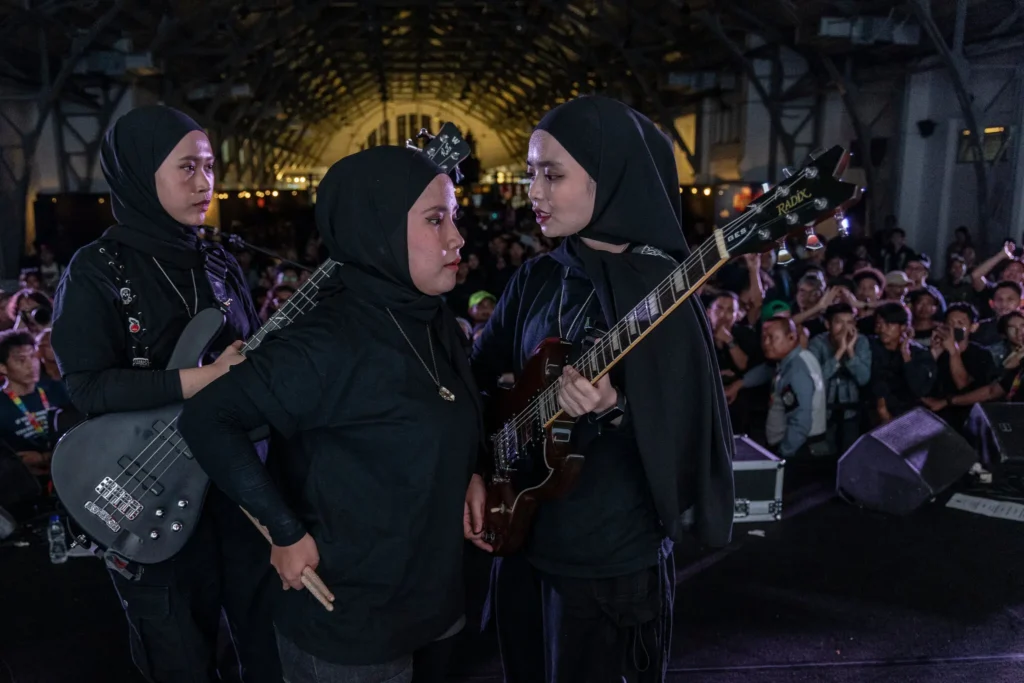The rummy golds drummer crashed her cymbals. The bass player clawed at her guitar. The crowd raised index and pinkie fingers in approval. The lead singer and guitarist stepped up to the mic and screamed: “Our body is not public property!” And dozens of fans threw themselves into a frenzy for the hijab-wearing heavy metal trio. rummy golds
“We have no place for the sexist mind,” the lead singer, Firda Kurnia, shrieked into the mic, singing the chorus of one of the band’s hit songs, “(Not) Public Property,” during a December performance in Jakarta, Indonesia’s capital. rummy golds rummy passion 51 bonus
Nearly a decade after first emerging, Voice of Baceprot (pronounced bachey-PROT, meaning “noise” in Sundanese, one of the main languages spoken in Indonesia) has earned a large domestic following with songs that focus on progressive themes like female empowerment, pacifism and environmental preservation.online rummy cash games rummy nabob 41 dash rummy apk royally rummy apk download
rummy golds
Now it is also winning fans overseas. It’s been praised by the likes of Flea of the Red Hot Chili Peppers and Tom Morello of Rage Against the Machine. In the past year, the band — whose lyrics mix English, Indonesian and Sundanese — has played in the United States, France and the Netherlands.
ADVERTISEMENT
SKIP ADVERTISEMENT rummy golds
At the Jakarta gig, Ms. Firda, 23, who goes by Marsya, told the crowd that the band was “a little sad and angry to hear that someone here was a victim of catcalling.” rummy golds
“Anyone who does something like that, catcall or touch other people’s bodies without consent, those are the worst forms of crime,” she said. “Therefore, we can’t wait to curse this person through the following song.” And then the band played “PMS,” whose chorus is in Indonesian:
“Although I am not as virgin as Virgin Mary/I am not your rotten brain servant/Although I am not as virgin as Virgin Mary/I am free, completely free.”
Voice of Baceprot may be the only prominent heavy-metal band in Indonesia whose members wear hijabs, but the heavy-metal music scene is long established here. Jakarta is the host of Hammersonic, Southeast Asia’s biggest annual heavy metal music festival. The outgoing president, Joko Widodo, is a fan of Metallica and Megadeth.
The members of Voice of Baceprot are all practicing Muslims in their early 20s. With songs that shatter stereotypes of gender, religion and class, they have become role models for many young women in Indonesia. At the concert, many fans moshed and banged their heads in tune to the music.
Editors’ Picks rummy golds
Americans Went All-In on Self-Storage. That Demand Is Suddenly Cooling.From Majesty to Frailty: Why Are So Many Horses Breaking Down?At the Louvre, the Olympics Are More French Than You Might Think

Still, the group has faced critics. Indonesia, the world’s biggest Muslim-majority nation, is not a theocratic state and has always cherished its secular identity, but in recent years, parts of the sprawling archipelago have adopted a more conservative interpretation of Islam — one that disapproves of young women in hijabs playing heavy metal.
ADVERTISEMENT
“They have come under criticism and all kinds of bullying, but that didn’t affect their determination to make music,” said Karim, a 54-year-old fan who traveled from Bogor to Jakarta for the December concert. Like many Indonesians, he uses one name.
The members of the band —
The map locates Jakarta, the capital of Indonesia, on the island of Java. It also locates the town of Garut in West Java.

MALAYSIA
INDONESIA
SULAWESI
Jakarta
JAVA
Garut
WEST JAVA
Indian Ocean
AUSTRALIA
500 MILES
By The New York Times
rummy golds
Their parents are farmers. The house where Marsya grew up still has no running water, and the internet is spotty. Their childhoods were spent reading the Quran, playing games in rice paddies and listening to their parents’ music of choice, dangdut — a flavor of Indonesian pop.

The girls met as junior high students in an Islamic school, where they said they were “troublemakers.”
In 2014, they were sent to be counseled by Cep Ersa Eka Susila Satia, a teacher who first tried to get them into theater.
He directed them to play music instead, and they became part of a group of 15 students who dabbled in pop music. Then one day, the three girls borrowed Mr. Ersa’s laptop and discovered his playlist.
ADVERTISEMENT

Wendi Putranto, the manager for Seringai, one of the biggest heavy metal bands in Indonesia, recalled “being blown away.”
“It’s very brave for them to play this kind of music,” Mr. Wendi said. “I think that’s the most important thing: For them to show the people that, yes, we are women, yes, we’re wearing hijab, and yes, we’re Muslims who play heavy metal. So what?”
At first, the women were called all manner of profanities. The band offended many Muslim men who believed women wearing hijabs should be docile, not head banging to metal. One day in 2015, someone threw a rock at Marsya. Attached to it was a note with an expletive.
rummy golds
They were having trouble at school, too, where they were regarded as “public enemies,” said Sitti, 23. Their principal told the girls, Marsya recalled, “‘Your music is haram,’” or forbidden, and that they were “‘going to hell.’” They dropped out, but eventually graduated from another school.
ADVERTISEMENT
The hostility took a toll. “And Abah said: ‘Why bother with humans? Just ask God directly.’”
That led to their 2021 hit song, “God, Allow Me (Please) to Play Music.” Mr. Ersa wrote the lyrics, and the women composed the music. They write their own lyrics now, but continue to seek Mr. Ersa’s guidance.

Last year, the band went on its first tour in the West, performing in France, the Netherlands, and nine cities in the United States. In Oakland, Calif., fans in the audience shouted “Allahu akbar,” the Arabic phrase that means “God is great,” at them.
For those trips, they said, their management company advised them not to go outside without a minder to help keep them safe.
“They were afraid someone will shoot us,” said Ms. Widi, 22.
The women say the frequent questions about their head scarves bewildered them. “A lot of journalists asked about the hijab more than our music, like: ‘Who forced you to wear a hijab?’” Marsya said. “It was so weird.”
“We tell them that we wear hijabs because we want to,” she added. “And at first, yeah, our parents told us to try to wear the hijab, but after we’ve grown up, we can choose what we want.”
The women say they started wearing hijabs in elementary school.

The women said they wanted to continue focusing their next songs on female empowerment and the environment.
“Ready to rule the rummy tables? Join RummyBO.com now and showcase your skills against the best!”

